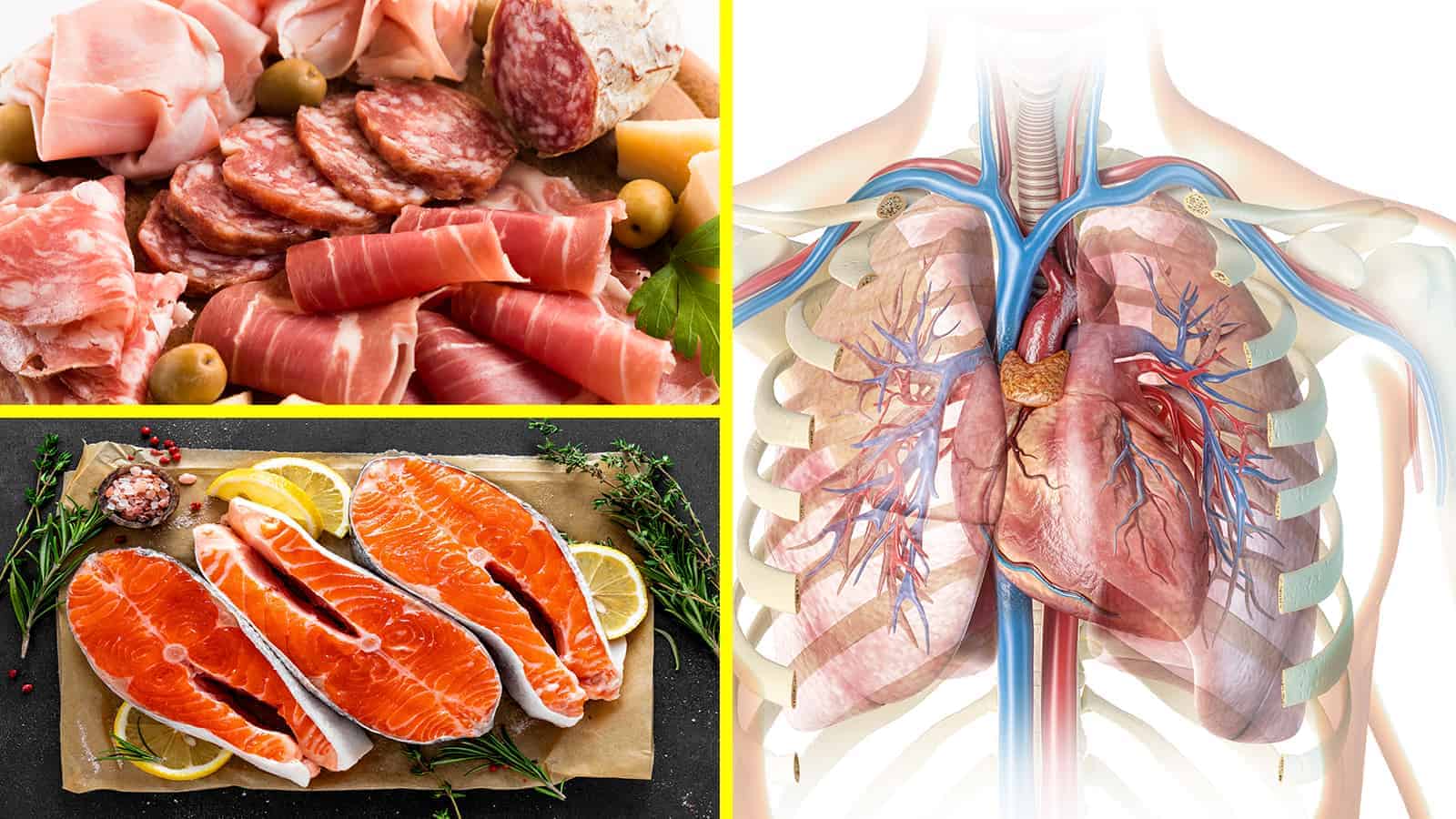The heart is the most crucial organ in the body. It keeps you ticking along and needs to stay healthy as you grow older. With so many different organ functions that can contribute to the improvement or detriment of cardiovascular strength, it can be overwhelming to manage heart health due to all the various factors involved.
Luckily, there is a simple solution that can encompass many of these factors in one: diet! The food you eat can significantly affect different functions of the body, so eating the wrong things can send your heart health down just as quickly as eating the right things can send it up. Here’s how cardiologists reveal five foods that are harmful to your heart and four foods best for your heart!
Five Foods That Are Harmful To Heart Health
1. Refined Carbohydrates
Carbohydrates give the body the energy it needs to get through the day. However, in excess, they’re also responsible for a lot of seemingly small issues that all relate to the heart. These problems can build over time and contribute to a higher risk of certain cardiovascular troubles. This is especially true for refined carbohydrates, most of which have been stripped of their best nutrients.
Here are some examples:
· White Bread
Rolls and bread are on the list of the American Heart Association’s “salty six.” This list refers to foods with a high sodium content that are the most significant sources of that component among Americans who eat it. White bread has little vitamins and little fiber, so there is nothing to help it be adequately digested. This causes it to provoke blood sugar imbalances.
· White Rice
White rice is packed with carbohydrates that are much too processed to be of sufficient nutritional value. They can increase belly fat, according to Univision Network chief medical correspondent, cardiologist, and author Juan Rivera, MD, and that added belly fat can worsen the risk for heart conditions. Studies also indicate that rice consumption has some effects on cardiovascular problems.
· Cereals
There are some breakfast cereals designed to be more mindful of health, but most are packed with lots and lots of sugar, no matter what other health benefits they tout. Inflammation and other issues can arise from overeating cereal, especially if you like sugary kinds.
2. Low-Fat Foods
It’s easy to see the word “low-fat” and automatically think it’s good for the heart. Sadly, this isn’t the case, says Fisher. Fat is what makes dressings taste good, and a lack of them can mean that extra flavor must be added in the form of sugar or salt. So the next time someone tells you to stop eating fatty meals, put on some positive thinking and remember these low-fat foods to avoid:
· Fat-Free or Low-Fat Peanut Butter
Peanut butter is very fatty – but that fatty is of the right kind! Omega-6 fatty acids and other positive forms of fat are abundant in this delicious spread, and they’re all monounsaturated and good for you, says Fisher. If you opt for low-fat or fat-free options, not only will that great fat be gone, but it’ll also be replaced by sugar.
· Low-Fat Dressings
Most salad dressings and similar sauces would taste horrible if they weren’t full of sugar or sodium. Most standard reduced-fat dressings add an element of unhealthiness to salads.
· Fat-Free Packaged Snacks
Anything that unnaturally removes fat from its contents is questionable in health value at best. Fisher says that people are, more than ever, realizing that these fat-free snacks don’t help with weight loss. If a product is usually not fat-free, it’s a good idea to avoid fat-free versions of it. Healthy fats are good for satiety, blood sugar balance, and overall health that can all be positive for your heart.
3. Processed Meat
Meat is a good source of protein, but if you eat the wrong kinds of meat, you’ll wind up doing yourself a disservice. Here are some processed meats you should avoid:
· Hot Dogs
Hot dogs, frankfurters, and sausages – or whatever other similar names they go by! – are all packed with saturated fat, says Essential Nutrition For You owner and author Rania Batayneh, MPH. Even low-fat options aren’t safe due to high salt content. Both salt and saturated fat can contribute to blood pressure imbalances.
· Deli Meat
According to Fisher Nutrition Systems founder Suzanne Fisher, RD, LDN, many cured types of meat contain sodium nitrate, a preservative that can increase inflammation. Studies have actually found that nitrates can even be linked to atherosclerosis, or artery narrowing, because of the inflammation they cause!
· Rotisserie Chicken
Chicken, in itself, is often healthy food. But the pre-roasted ones you find in supermarkets are packed with saturated fats, salts, and a lot of other things that you wouldn’t find in something homemade.
4. Fried and Junk Food
This is a bit of a no-brainer. Of course, fried and junk foods are harmful to the heart. You might not realize just how bad they can be for the heart. Here are just three examples of how fried food packs on problems:
· Fried Chicken
Fried chicken is made with trans-fat-based oils that raise harmful cholesterol and ruin positive cholesterol. Batayneh adds that this is very typical in conventional frying. Research has found that those who eat more fried foods often face a higher mortality risk from problems like coronary artery disease. The Food & Drug Administration had to ban the use of trans fats and began putting measures in place to start phasing out their use in food manufacturing and dining!
· Fries
French fries are also fried with trans fats, but that’s not the only reason they could be bad for your heart! Potato consumption in high amounts increases your risk of developing type 2 diabetes, hypertension, and other heart-related issues, according to multiple studies.
· Potato Chips
These are fried with trans fats and make use of potatoes, but potato chips also come with even more downsides – such as the fact that they’ve been found to cause more weight gain than every other kind of food, according to research! They also have a lot of salt and very little fiber to help them digest.
5. Sauces
Often, even the diet-conscious will focus so much on the actual meal that they’ll forget about the nutritional value of the sauces they’re adding. Don’t make that mistake! Here are some sauces to be careful about using too much of:
· Barbecue Sauce
It’s tempting to slather meats in this tangy, savory-sweet sauce. Still, most bottled barbecue sauce has a whopping 310 mg of sodium in just two tablespoons – a shocking amount for such little product, and questionable for the heart.
· Tomato Ketchup
Store-bought ketchup and commercially sold ketchup is often packed with excess salt and sugar, says Rivera. Just two tablespoons of the stuff have 14% of the daily recommended sodium intake and have a whopping 8 grams of sugar! That’s way too much and can’t be positive for the heart.
· Marinara Sauce
Half a cup of marinara sauce can deliver a whopping 400 mg of sodium to your body (and 4 grams of sugar), a huge amount that can affect your heart. If you’re making a dish that needs marinara sauce, you can use a low-sodium version or switch to olive oil for another complementary taste.
Four Foods That Are Most Beneficial for Heart Health
1. Whole Grains
Whole grains are arguably the most nutritious kind of grain you can get. They contain not just one individual component while removing the fiber and nutritional value, but all three parts that matter most:
- Bran
- Endosperm
- Germ
These three parts mean the grain provides vast dietary benefits, ranging from high fiber to the reduction of harmful cholesterol. Hand-in-hand, they work together to improve your heart health. Studies have even found that consuming three additional whole grain servings in a day can lead to a 22% lowered heart disease risk!
2. Fatty Fish
We’ve talked about the importance of good fats. Now, here’s a great way to get some: fatty fish, like:
- Salmon
- Tuna
- Sardines
- Mackerel
These fish are all rich in omega-3 fatty acid, which is famous for having positive effects on the heart. Studies have found that they can reduce diastolic blood pressure, bad cholesterol, and the risk of many diseases. In fact, not eating them can significantly up your chances of developing high blood pressure, obesity, and even diabetes!
3. Berries
Berries are full of all sorts of different nutrients, including powerful antioxidants that fight the worst effects of inflammation – especially the results that can lead to heart disease, according to research. Examples of berries that do this job well include:
- Blackberries
- Blueberries
- Raspberries
- Strawberries
Berries can also reduce multiple different cardiovascular problem risk factors. For example, it can lower symptoms of metabolic syndrome while bringing down lousy cholesterol, allowing more positive kinds to take its place.
Blueberries specifically are additionally helpful as they provide aid to blood vessel cells. This helps reduce the risk of unnecessary blood clotting, promotes healthy blood clotting, and balances out blood pressure. On top of all that, all berries are low in calories, making them great desserts!
4. Garlic
Garlic has been used for medicinal purposes for centuries, and modern studies have confirmed that our ancestors were onto something. This is because it contains something called allicin, a compound with multiple exciting effects.
Studies have found that regular consumption of garlic extract over a prolonged period successfully lowers blood pressure with the same level of positive effects as actual prescription medications. It can also bring down bad cholesterol, reduce stroke risk, and lower your chances of developing a blood clot.
If you’re going to eat garlic to gain these benefits, crush it and allow it to sit for a short while before you toss it in a pan to cook. You can also consume it raw if you can stomach it with positive thinking!
Final Thoughts On Some Foods That Are Harmful To Your Heart And Some That Are Best For Your Heart
Many foods harmful to the heart are nice to eat, and that can pose a problem to those who aren’t aware of the damage their favorite treats are doing. By staying aware of foods that can increase the risk of cardiovascular disease and those that lower it, you’ll be ahead of the game in maintaining heart health.

















 Community
Community

